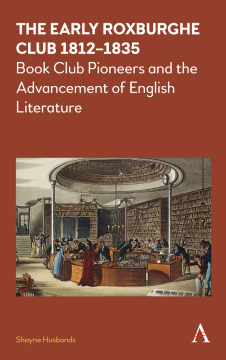
Additional Information
Book Details
Abstract
The Roxburghe Club, founded in 1812, has an unbroken publishing history from 1814 to the present day. The Early Roxburghe Club 1812–1835 offers a new narrative for the formative years of the Roxburghe Club, for the ‘bibliomania’ of the Romantic period and for early nineteenth-century antiquarian culture and its relationship to the emergent popularity and status of English vernacular literature. By examining in detail the make-up and membership of the club, including its social and political affinities, this revised history of the first two decades of its existence offers both an alternative view of the early club and its significant contribution to the move between antiquarian and scholarly areas of influence in the study of English literature.
The Roxburghe Club, founded in 1812, has an unbroken publishing history from 1814 to the present day. Since the Club’s edition of ‘Havelok the Dane’ appeared in 1828, the Roxburghe has gained a reputation as a producer of beautifully printed editions of manuscripts and reprinted early books. The founding period of the Club, however, has been viewed with less approval, often seen as a frivolous, unscholarly period of wasted years when little of value was produced by a membership composed of dilettante aristocrats.
This work offers a new narrative of the formative years of the Roxburghe Club, for the bibliomania of the Romantic period and for early nineteenth-century antiquarian culture and its relationship to the emergent popularity and status of English vernacular literature. It addresses what is shown to be a long-repeated myth: what the Club was and whether its scholarship and editing of early English literature merited respect or mockery. The book covers the make-up and membership of the Club including social and political affinities, literary and scholarly achievements and the substantial contribution made by the Club to widening awareness and understanding of earlier English writers and the establishment of a canon of English literature. This revised history offers an alternative narrative for the move between antiquarian and scholarly areas of influence in the study of English literature, and offers a plausible mechanism for the growing acceptance of vernacular English literature, both in academia and in a more general cultural sense.
‘A helpful study, distinguished by its careful archival research and insight into the relationship between the history of knowledge and the history of sociable networks. Husbands sheds new light on the early years of the Roxburghe Club and the role that Regency bibliophiles played in the development of literary scholarship.’
—Deidre Lynch, Ernest Bernbaum Professor of Literature, Harvard University, USA
Shayne Husbands completed her doctoral studies from Cardiff University, UK. Her areas of research include the Roxburghe Club, bibliomania, Joseph Haslewood and the culture of early nineteenth-century book collecting. She has contributed to Manuscripts and Printed Books in Europe 1350–1550: Packaging, Presentation and Consumption (2013).
Table of Contents
| Section Title | Page | Action | Price |
|---|---|---|---|
| Cover | Cover 1 | ||
| Front Matter | ii | ||
| Half-title | i | ||
| Series information | ii | ||
| Title page | iii | ||
| Copyright information | iv | ||
| Contents | v | ||
| List of figures | vii | ||
| Acknowledgments | ix | ||
| Chapter Int-9 | 1 | ||
| Introduction | 1 | ||
| Chapter 1 The Persistence of Myth | 5 | ||
| Chapter 2 Scandal, Libel and Satire | 15 | ||
| Chapter 3 The Roxburghe Club and the Politics of Class | 35 | ||
| Chapter 4 Politics, Religion, Money | 47 | ||
| Chapter 5 Club Members and Their Book Collections | 65 | ||
| Chapter 6 The Passion for Print | 87 | ||
| The Lee Priory Press | 92 | ||
| The Auchinleck Press | 95 | ||
| The Beldornie Press | 96 | ||
| Chapter 7 The Literary Works of the Roxburghe Club Members | 101 | ||
| Chapter 8 The Club Editions | 125 | ||
| Chapter 9 The Legacies of the Club | 149 | ||
| Conclusion | 173 | ||
| End Matter | 177 | ||
| Appendix 1: The Club Membership 1812–1835 | 177 |
